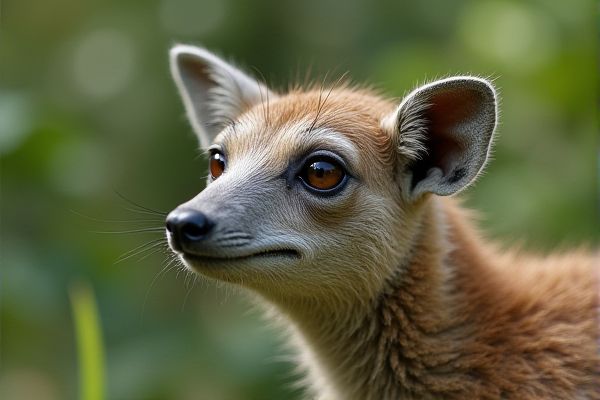
Zoologists in Kenya can explore diverse job opportunities within wildlife conservation organizations, research institutions, and governmental agencies focused on biodiversity management. Positions often involve fieldwork, data collection, and species monitoring, contributing significantly to the understanding of ecosystems and wildlife behavior. Potential employers include the Kenya Wildlife Service (KWS), non-governmental organizations like African Wildlife Foundation, and academic institutions offering specialized programs in zoology. Networking at conferences and professional associations can also enhance job prospects and foster valuable connections in the field.
Job Description
Zoologist jobs in Kenya typically involve studying animal species, their behaviors, and habitats to contribute to wildlife conservation efforts. Many positions require field research, data collection, and analysis to assess the health of ecosystems and inform conservation strategies. Collaboration with local communities and organizations is essential for effective wildlife management and education. Opportunities exist in governmental agencies, non-profit organizations, and research institutions dedicated to protecting Kenya's rich biodiversity.
Requirement
Zoologist jobs in Kenya typically require a Bachelor's degree in Zoology, Biology, Wildlife Management, or a related field. Practical experience through internships or volunteer work with wildlife organizations is highly valued and often necessary for entry-level positions. Knowledge of Kenya's unique ecosystems, such as the savannahs and coastal regions, can enhance your understanding and effectiveness in the role. Familiarity with research methods and data analysis is essential for assessing wildlife populations and habitats in this biodiverse country.
Salary and Perks Expected
Zoologist jobs in Kenya offer diverse opportunities in wildlife conservation, research, and education. Salaries typically range from KES 60,000 to KES 120,000 per month, depending on experience and the specific role. Perks may include fieldwork opportunities, health insurance, and potential housing allowances, making these positions attractive for animal enthusiasts. Your contribution can directly impact the preservation of Kenya's rich biodiversity and enhance community awareness about conservation efforts.
Similar Job Names
- Wildlife Biologist
- Conservation Scientist
- Research Zoologist
- Zoo Curator
- Animal Behaviorist
- Wildlife Manager
- Marine Biologist
- Ecologist
- Field Researcher
- Education Officer
- Wildlife Veterinarian
- Biodiversity Specialist
- Environmental Consultant
- Habitat Restoration Specialist
- Conservation Program Manager
- Regulatory Affairs Specialist
- Animal Nutritionist
- Ecotourism Coordinator
- Zoological Technician
- Policy Advisor in Wildlife Conservation
Job Expectation Concept
Zoologist jobs in Kenya encompass a variety of responsibilities, including research, wildlife conservation, and educating the public about animal behavior and ecosystems. Professionals in this field may work in national parks, wildlife reserves, or research institutions, focusing on the diverse fauna found throughout the country. Fieldwork often involves collecting data, monitoring animal populations, and contributing to conservation efforts aimed at protecting endangered species. A strong understanding of Kenya's unique ecosystems and the challenges they face is crucial for success in this rewarding career.
Career Advantage and Weakness
In Kenya, pursuing a career as a zoologist offers distinct advantages, such as the opportunity to work in diverse ecosystems and contribute to the conservation of wildlife, including iconic species like elephants and rhinos. Engaging in field research allows for hands-on experience and a chance to influence environmental policies that protect habitats. However, one potential weakness is the competitive nature of the job market, where limited funding and resources can hinder research opportunities and career advancement. Your success may depend on networking with local organizations and gaining specialized skills in areas such as wildlife management or ecological research.
Important Thing Must Know
Zoologist jobs in Kenya offer diverse opportunities in research, conservation, and education related to wildlife and ecosystems. Many zoologists work for organizations dedicated to the preservation of Kenya's rich biodiversity, including both terrestrial and aquatic species. Practical experience in fieldwork is essential, as it allows you to gain valuable insights into animal behavior, habitat, and conservation methods. Collaborating with local communities and government agencies is crucial to implementing effective conservation strategies. The demand for zoologists in Kenya continues to grow, driven by increased awareness of environmental issues and the need for sustainable management of natural resources.
Alternative Career Options
Zoologists in Kenya can explore diverse career options beyond traditional roles in wildlife research and conservation. Opportunities in ecotourism management allow you to utilize your expertise in animal behavior to enhance visitor experiences while promoting sustainable practices. Additionally, roles in environmental policy and advocacy enable you to influence legislation aimed at wildlife protection and habitat preservation. Education and outreach positions in schools or NGOs provide avenues for sharing your knowledge and passion for wildlife with the community.
Companies List
- Kenya Wildlife Service (KWS)
- African Wildlife Foundation
- David Sheldrick Wildlife Trust
- Kenya Project Trust
- Nairobi National Park
- Ol Pejeta Conservancy
- Friends of Nairobi National Park
- Lewa Wildlife Conservancy
- Wildlife Conservation Society Kenya
- East African Wildlife Society
List of Ideal City
Nairobi, as the capital city of Kenya, offers numerous opportunities for zoologists, particularly with organizations like the Kenya Wildlife Service and various research institutions. Kisumu, located near Lake Victoria, supports wildlife research initiatives and conservation projects, providing an environment conducive to aquatic biology studies. Mombasa, with its rich marine biodiversity, is ideal for zoologists specializing in marine life and coastal ecosystems. Lastly, Eldoret, situated near various national parks and reserves, allows for fieldwork and research in diverse terrestrial habitats.
 jobs-kenya.com
jobs-kenya.com